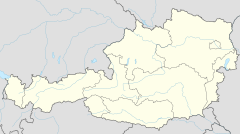Mass graves in Škofja Loka
Mass graves in Škofja Loka were created in Škofja Loka, Slovenia during and after the Second World War. The Commission on Concealed Mass Graves in Slovenia has registered seven known mass graves in the city itself and an additional 20 in the Municipality of Škofja Loka.
Background
The concealed mass graves in Škofja Loka were created in the immediate aftermath of the Second World War, after British forces forcibly repatriated Home Guard soldiers that had fled to Austria to Yugoslavia from camps in Bleiburg,[1][2]: 136 [3]: 400 Lavamund,[1][3]: 400 Rosenbach,[3]: 400 Viktring (a district of Klagenfurt),[3]: 394 and elsewhere. They are part of the mass graves associated with the nearby former Loka Castle prison, where Home Guard members and civilians that did not flee to Austria were also killed en masse.[4] The Skofja Loka prison has been characterized as an extermination camp that was also used for torture.[5]
List of mass graves
Škofja Loka is the site of seven known mass graves from the period immediately after the Second World War. Two additional mass graves connected with these are located in neighboring Vincarje. An unknown number of Home Guard prisoners of war and Slovene civilians, and possibly victims of other nationalities, were murdered and buried at several sites in and around Loka Castle.
- The Loka Castle Yard Mass Grave (Slovene: Grobišče na vrtu loškega gradu), also known as the Castle Dance Floor Mass Grave ([Grobišče Plesišče pri gradu] Error: {{Lang}}: text has italic markup (help)), is located in the castle park.[6]
- The Castle Wall 1 Mass Grave (Slovene: Grobišče pri grajskem obzidju 1) is located in a meadow on a slope about 30 m outside the wall of Loka Castle, in Vincarje. It contains the remains of an unknown number of Home Guard prisoners of war and Slovene civilians, and possibly victims of other nationalities.[7]
- The Castle Wall 2–6 mass graves ([Grobišče pri grajskem obzidju 2–6] Error: {{Lang}}: text has italic markup (help)) are located around the castle perimeter. Grave number two lies in a meadow by the southwest corner of the castle wall and the remains of five victims were discovered at the site in December 2006.[8] The third grave lies on the inside of the southwest corner of the wall.[9] The fourth grave is in a meadow next to the tree-lined boulevard.[10] The fifth grave is on the left side of the path next to the wall.[11] The sixth grave is to the right, below the path.[12]
- The Viršk Field Mass Grave ([Grobišče Virško polje] Error: {{Lang}}: text has italic markup (help)) is located on the southern edge of the town, between the Poljane Sora River and the road to Gorenja Vas, near two bunkers. It contained the remains of an unknown number of German prisoners of war. It is believed that the remains were disinterred after the war.[13]
- The Bear Valley Mass Grave ([Grobišče v Medvedovi dolini] Error: {{Lang}}: text has italic markup (help)), also known as the Ski Valley Mass Grave ([Grobišče Smučarska dolina] Error: {{Lang}}: text has italic markup (help)), lies in the Bear Valley Sinkhole ([Medvedova dolina] Error: {{Lang}}: text has italic markup (help)) in Vincarje, about 500 m southwest of Loka Castle and 200 m east of the castle wall. It contains the remains of 20 German prisoners of war that died or were murdered in the summer of 1945. The remains may have been exhumed.[14]
-
Loka Castle Yard Mass Grave
-
Castle Wall 2 Mass Grave
-
Castle Wall 3 Mass Grave
-
Castle Wall 4 Mass Grave
-
Viršk Field Mass Grave
-
Bear Valley Mass Grave, Vincarje
Other mass graves
Additional mass graves in the Municipality of Škofja Loka are located in Bodovlje, Breznica pod Lubnikom, Crngrob, Dobruška Vas, Gabrovo, Križna Gora, Pevno, Puštal, Sopotnica, Trnje, and Vešter.
References
- ^ a b Booker, Christopher. 1997. A Looking-Glass Tragedy. The Controversy over the Repatriations From Austria In 1945. London: Gerald Duckworth & Co Ltd., p. 214.
- ^ Vuletić, Dominik. 2007. "Kaznenopravni i povijesni aspekti bleiburškog zločina." Pravnik 41(85): 125–150.
- ^ a b c d Grahek Ravančić, Martina. 2009. "Izručenja i sudbine zarobljenika smještenih u savezničkim logorima u svibnju 1945. Journal of Contemporary History 41(2): 391–416.
- ^ Corsellis, John, & Marcus Ferrar. 2005. Slovenia 1945: Memories of Death and Survival after World War II. London: I. B. Tauris, p. 87.
- ^ Mikola, Milko. 2008. Koncentracijsko taborišče Št. Vid nad Ljubljano. Dokumenti in pričevanja o povojnih koncentracijskih taboriščih v Sloveniji II. del. Koncentracijska taborišča Št. Vid nad Ljubljano, Škofja Loka in Teharje ter taborišče za otroke Petriček, pp. 13–18. Ljubljana: Študijski center za narodno spravo, p. 14.
- ^ Loka Castle Yard Mass Grave on Geopedia Template:Sl icon
- ^ Castle Wall 1 Mass Grave on Geopedia Template:Sl icon
- ^ Castle Wall 2 Mass Grave on Geopedia Template:Sl icon
- ^ Castle Wall 3 Mass Grave on Geopedia Template:Sl icon
- ^ Castle Wall 4 Mass Grave on Geopedia Template:Sl icon
- ^ Castle Wall 5 Mass Grave on Geopedia Template:Sl icon
- ^ Castle Wall 6 Mass Grave on Geopedia Template:Sl icon
- ^ Viršk Field Mass Grave on Geopedia Template:Sl icon
- ^ Bear Valley Mass Grave on Geopedia Template:Sl icon







